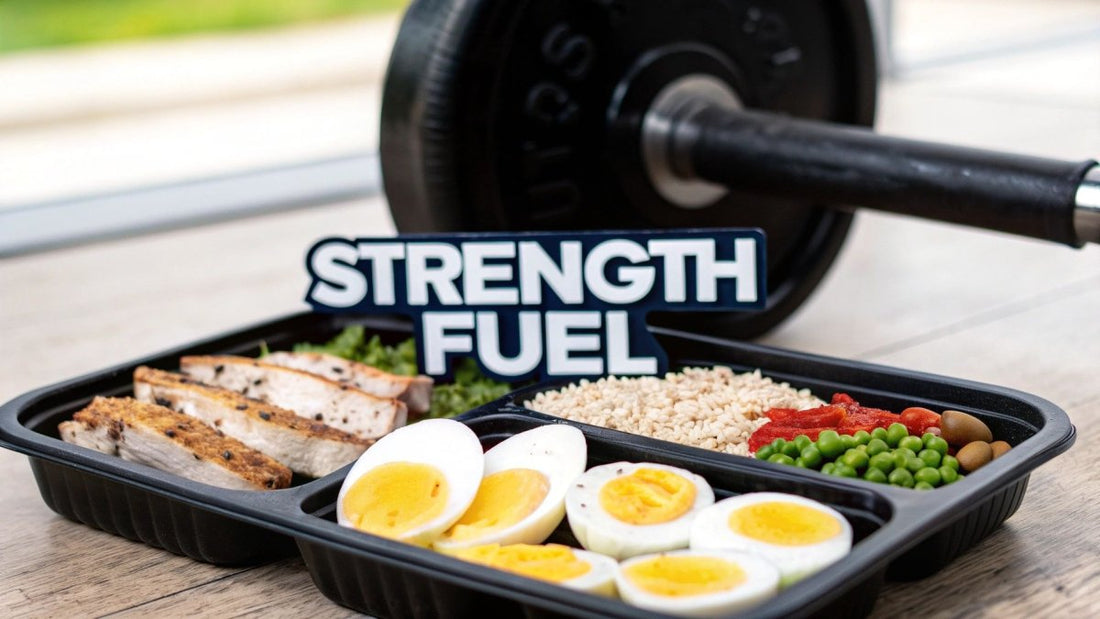
Nutrition for Strength Training Your Ultimate Guide
Share
You can lift all the weights in the world, but if your nutrition isn't on point, you're only doing half the job. Honestly, the real secret to getting stronger isn't found in some punishing, restrictive diet. It’s about intelligently fueling your body with the right raw materials: high-quality protein to rebuild muscle, complex carbohydrates to power your workouts, and healthy fats to keep your hormones in check.
Why Your Nutrition Is the Key to Unlocking Strength
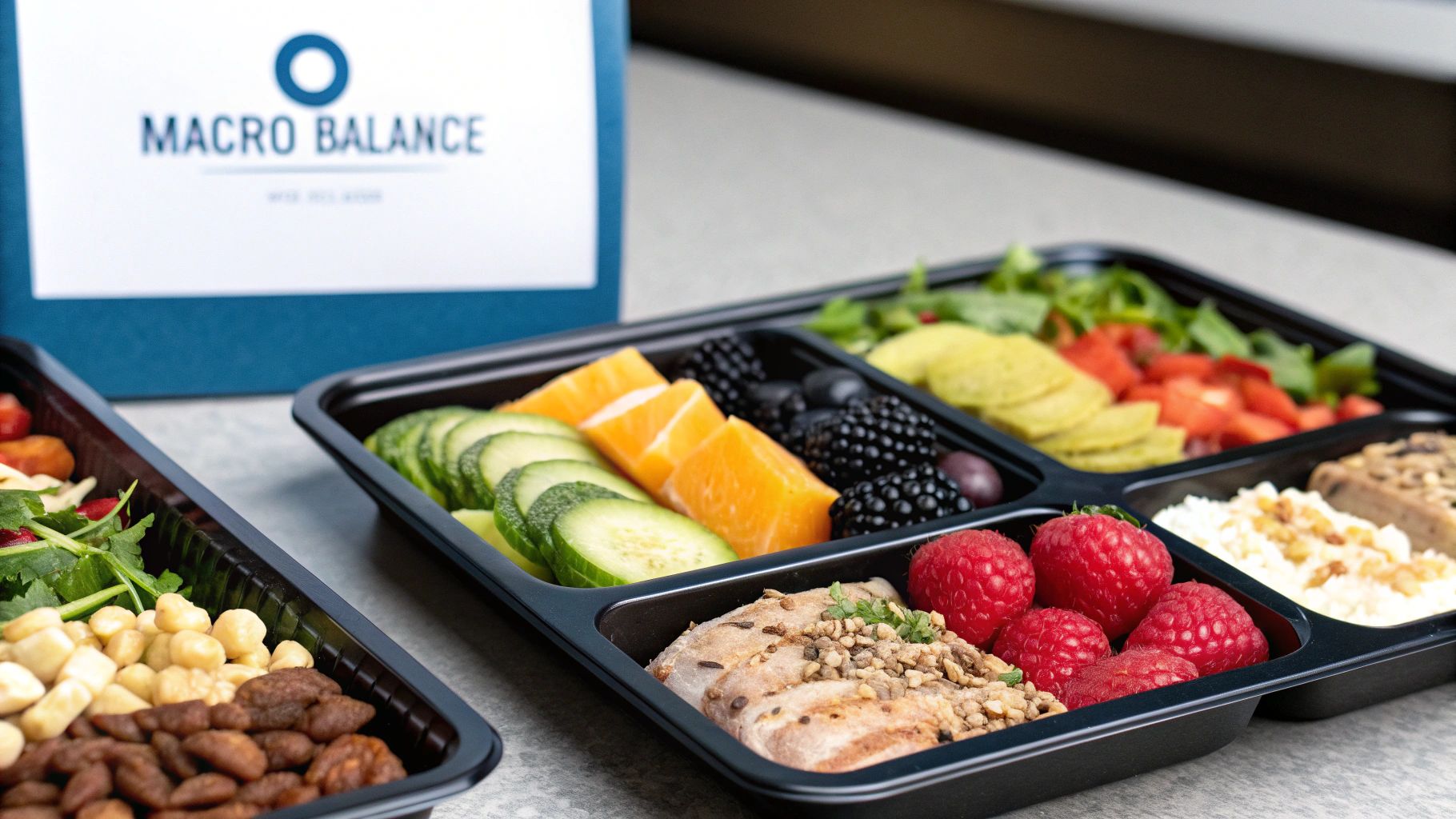
It’s a classic mistake I see all the time: athletes with perfectly programmed workouts who treat their diet like an afterthought. Think of it this way—you wouldn't build a race car with a world-class engine and then fill it with cheap, low-grade fuel. It just won't perform. Your body is no different.
The food you eat literally provides the building blocks for muscle growth and the raw energy needed for those grueling sessions under the bar. Without the right nutrients, your body can't effectively repair the microscopic muscle damage that lifting creates. That repair process is exactly how you get bigger and stronger. To see the full picture of how this works, check out our guide on how to get stronger.
More Than Just Muscle
A smart nutrition plan does so much more than just build bigger biceps. It’s the foundation for hitting new PRs, boosting your long-term metabolic health, and even sharpening your mental game. When your body is properly fueled, everything clicks. You'll notice:
- Sustained Energy: Forget hitting a wall mid-workout. The right foods give you a steady stream of power to crush every last set and rep.
- Faster Recovery: A nutrient-dense diet helps calm inflammation and reduces that post-workout soreness, meaning you can get back in the gym sooner and train harder.
- Improved Focus: The gut-brain connection is real. A clean diet supports cognitive function, keeping you dialed in and motivated during your lifts.
The positive effects of combining smart nutrition with a solid training plan ripple out into your overall health. It's no surprise that strength training is surging in popularity worldwide. A massive analysis showed that just 30 to 60 minutes of muscle-strengthening activity each week is associated with a 10% to 20% lower risk of death from all causes, heart disease, and cancer.
Let’s be clear: You can't out-train a bad diet. No matter how perfect your program is, your results will eventually hit a wall if your nutrition isn't aligned with your goals.
This guide will help you shift your mindset from seeing food as mere calories to understanding it as powerful fuel. My goal is to show you that dialing in your nutrition is the single most effective thing you can do to unlock your true strength. Let's get to work.
Mastering Your Macros: The Building Blocks of Muscle
If you're serious about getting stronger, you have to think of your body as a high-performance construction project. Your macronutrients—protein, carbohydrates, and fats—are the raw materials. Each one has a critical, non-negotiable job, and getting the right balance isn't about some restrictive diet. It’s about giving your body exactly what it needs to perform, repair, and grow.
Think of it like building a house. Protein is the literal bricks. Every time you lift weights, you're creating tiny micro-tears in your muscle fibers. Protein provides the amino acids to patch up that damage, building the muscle back even stronger. Without enough bricks, your construction site just can't keep up.
Next, you need a powerful crew to do the heavy lifting. That's where carbohydrates come in. They are your body’s go-to energy source, stored in your muscles as glycogen. This is the high-octane fuel your crew burns to grind through intense sets. Cutting carbs too low is like sending your workers home early—the job simply won't get done.
Finally, every project needs the essential infrastructure—the wiring, the plumbing. That's the role of healthy fats. They're absolutely crucial for producing hormones like testosterone, a key player in muscle growth. Fats also help you absorb important vitamins and keep inflammation in check, ensuring everything runs smoothly behind the scenes.
To dial in your nutrition, it's helpful to start with proven targets. The table below outlines the general daily recommendations for strength athletes, giving you a solid foundation to build from.
Daily Macronutrient Targets for Strength Training
| Macronutrient | Recommended Intake (g/kg of body weight) | Primary Role in Strength Training |
|---|---|---|
| Protein | 1.6 - 2.2 g/kg | Muscle repair, growth, and recovery |
| Carbohydrates | 3.0 - 5.0 g/kg | Primary fuel source for high-intensity training |
| Fats | 20-30% of total calories | Hormone production and overall health |
Remember, these numbers are a starting point. Your individual needs will vary based on your training intensity, goals, and metabolism.
Your Blueprint For Protein Intake
For anyone serious about strength, protein is king. It’s not just about hitting a number; it’s about quality and timing. Getting enough high-quality protein is the cornerstone of muscle protein synthesis—the actual process of rebuilding and growing muscle.
This diagram breaks it down perfectly, showing how protein is central to repairing damaged tissue and sparking new growth.
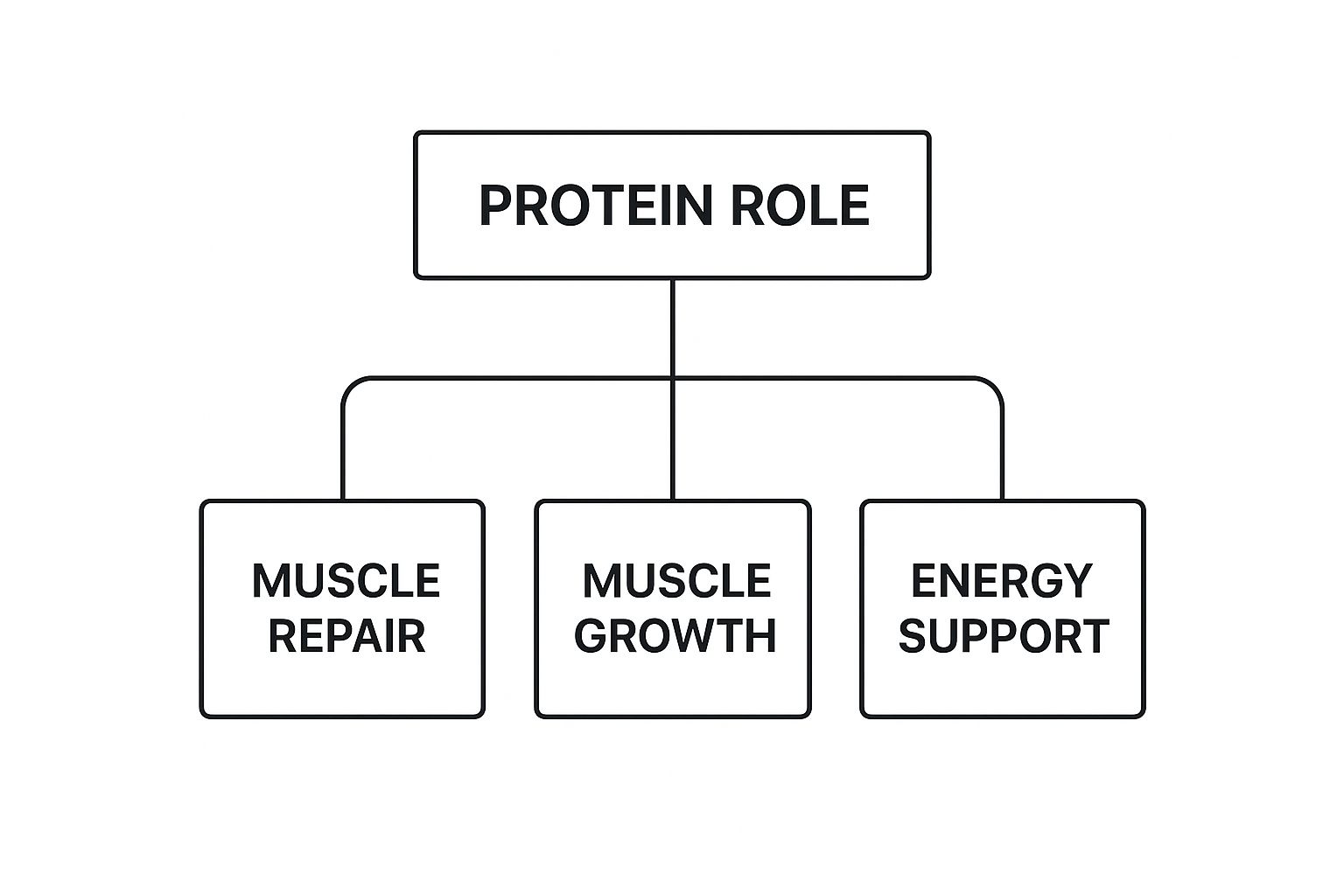
The takeaway is simple: no matter how hard you train, if protein is lacking, the muscle-building process grinds to a halt.
For strength athletes, the target is way higher than for the average person. A great place to start is 1.6 to 2.2 grams of protein per kilogram of body weight (that’s about 0.7 to 1.0 grams per pound).
Spreading your protein intake throughout the day is far more effective than trying to cram it all into one or two giant meals. Aim for 20-40 grams every 3-4 hours to keep that muscle-building signal switched on.
This approach is backed by experts who emphasize that consistent protein intake, paired with smart training, is vital for muscle growth. Muscles don't just make you strong; they boost your metabolism and can even help protect against conditions like type 2 diabetes. As many now realize, getting enough quality protein is essential for anyone looking to optimize their health and performance. If you want to dive deeper, you can learn more about how to build and protect your muscles in 2025 on hautelivingsf.com.
Fueling Performance With Carbohydrates
Carbs have gotten a bad rap over the years, but for a strength athlete, they are pure performance fuel. If you let your muscle glycogen stores run on empty, your ability to train with intensity and volume will tank, completely undermining your progress. The trick is to be smart about which ones you eat.
- Complex Carbs: These should be your bread and butter. Think oats, brown rice, quinoa, and sweet potatoes. They provide a slow, steady stream of energy without sending your blood sugar on a rollercoaster.
- Simple Carbs: Use these strategically. A piece of fruit or a sports drink right before a workout can give you a quick jolt of energy. They're also perfect for right after you train to rapidly restock your glycogen stores.
A solid daily target for strength athletes is 3 to 5 grams of carbs per kilogram of body weight (1.4 to 2.3 grams per pound). On your heaviest training days, you'll probably want to bump that number up to match your energy output and supercharge your recovery.
The Essential Role of Healthy Fats
Fats are calorie-dense, which is great, but their most important job is hormonal. chronically low-fat diets can torpedo your testosterone levels, which directly slams the brakes on your ability to build and maintain muscle.
Make a point to include plenty of unsaturated fats from quality sources like:
- Avocados
- Nuts and seeds
- Olive oil
- Fatty fish like salmon (which is packed with omega-3s)
Aim for fats to make up about 20-30% of your total daily calories. This gives you enough to support hormone production and overall health without crowding out the protein and carbs your body desperately needs to get stronger. Get these three macros right, and you’ll create the perfect internal environment for success.
The Real Deal on Nutrient Timing
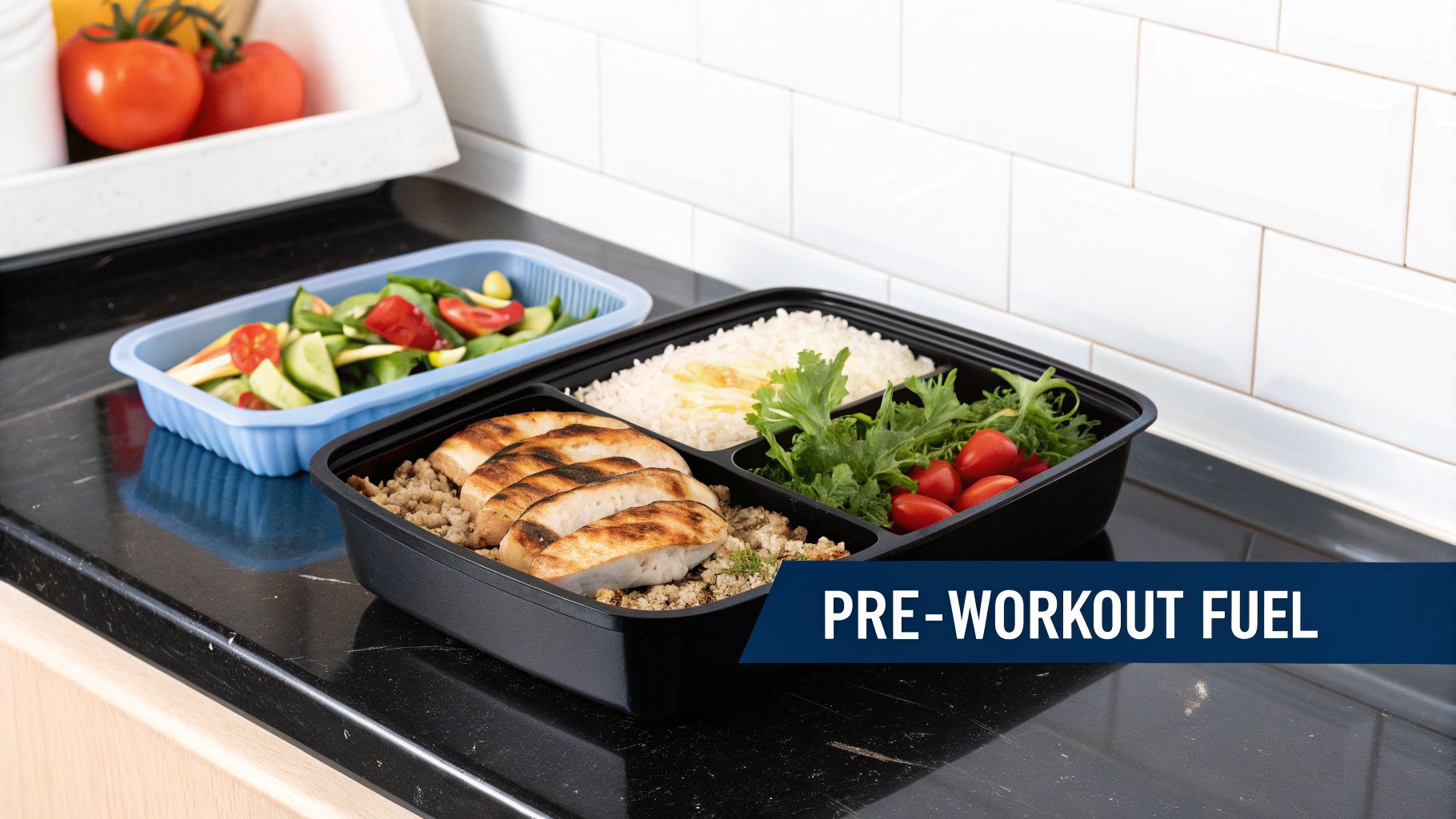
Few topics in the fitness world stir up as much confusion and frantic debate as nutrient timing. You’ve probably heard the lore of the “anabolic window”—that short, magical period post-workout when your muscles are practically screaming for nutrients. While there's a nugget of truth in that idea, the reality is a lot more flexible and way less stressful.
Let's get one thing straight: your total daily intake of calories and macros is king. Consistently hitting your protein and carb goals for the day will always trump worrying about the exact minute you eat a meal. Think of it like this: your overall nutrition is the entire season's performance, while nutrient timing is the strategy for a single, important game.
That said, being smart about your pre- and post-workout meals isn't useless. It can absolutely give you a noticeable edge in how you perform and recover. It’s all about optimizing the good fuel you’re already putting in your body.
Fueling Up Before You Lift
Your pre-workout meal has one job: to maximize your available energy. You want to top off your muscle glycogen stores—your body's primary fuel source for high-intensity work—and get a steady stream of energy to power through every single set. The ideal meal here is rich in carbohydrates with a moderate dose of protein.
The key is timing it right. Aim to eat this meal about 1 to 3 hours before you train. This gives your body plenty of time to digest everything so you feel powerful, not sluggish or weighed down by a full stomach.
A solid pre-workout meal might look like:
- A bowl of oatmeal with a handful of berries and a scoop of protein powder.
- A turkey sandwich on whole-wheat bread with a piece of fruit on the side.
- Greek yogurt mixed with granola and a bit of honey.
These meals are perfect because they deliver slow-releasing carbs for sustained energy and enough protein to start protecting your muscles from breakdown. A word of caution: steer clear of high-fat or super high-fiber meals right before a session, as they can slow digestion and cause some serious discomfort under a heavy barbell.
Kickstarting Recovery After Your Workout
Once you’ve put your body through the wringer, the mission shifts to recovery and repair. This is the post-workout meal's time to shine. Its purpose is twofold: replenish the glycogen you just torched and provide the amino acids needed to kickstart muscle protein synthesis—the actual process of rebuilding and growing your muscles.
This is where that "anabolic window" concept came from. We now know the window is much wider than the 30-minute panic zone people once believed in, but it’s still a great strategy to get a meal full of protein and carbs within 1 to 2 hours after your workout.
Following a workout, your muscles become more sensitive to nutrients like glucose and amino acids. Eating a well-rounded meal during this time helps your body shuttle those building blocks into your muscle cells more efficiently, which can seriously speed up the recovery process.
This heightened sensitivity makes the post-workout period a prime opportunity to refuel and rebuild. And if you trained on an empty stomach (say, first thing in the morning), this meal becomes even more crucial for stopping muscle breakdown in its tracks.
Here are some go-to post-workout meal ideas to get recovery rolling:
- Grilled Chicken or Salmon: Serve it with a large sweet potato and a side of roasted broccoli.
- Protein Smoothie: Blend a scoop of whey or plant-based protein with a banana, a handful of spinach, and your choice of milk.
- Egg Omelet: Whip up three or four eggs with chopped veggies and a side of whole-grain toast.
- Cottage Cheese: For a quick and easy option, a large bowl of cottage cheese mixed with pineapple or peaches gives you a great carb and protein punch.
At the end of the day, solid nutrition for strength is all about consistency, not perfection. Nail your daily macro targets first. Then, use smart meal timing as a powerful tool to elevate your performance and fast-track your results.
Fueling Performance with Micronutrients and Hydration
If macronutrients are the bricks and mortar of your physique, then micronutrients and hydration are the wiring and plumbing that make everything work. This is the side of nutrition for strength training that many people ignore, but it's where you can truly separate yourself from the pack. You can eat all the protein in the world, but if these crucial support systems aren't in place, your body simply can't put it to good use.
Think of it like this: minerals like magnesium are the foremen on your body's construction site. They don't lay the bricks themselves, but they're in charge of the whole operation. Magnesium, for instance, is a key player in over 300 enzymatic reactions in the body, governing everything from muscle contraction and energy creation to protein synthesis. Skimp on it, and your muscles just won't fire at full capacity.
It's the same story with vitamins. Vitamin D isn't just for strong bones; it's a major factor in regulating hormones, including testosterone, which is absolutely vital for building strength and muscle. Zinc is another powerhouse, essential for keeping your immune system robust and, critically, for repairing the muscle tissue you break down during tough workouts.
Key Micronutrients for Strength Athletes
When you're consistently pushing your body to its limits, your need for these compounds skyrockets. That’s why a diet packed with nutrient-dense foods isn't just a good idea—it's non-negotiable.
- Magnesium: You'll find it in leafy greens, nuts, seeds, and whole grains. It helps muscles function properly and can even improve sleep, which is ground zero for recovery.
- Zinc: Load up on meat, shellfish, legumes, and seeds. Zinc is your go-to for repairing muscle tissue and supporting an immune system that’s under stress from hard training.
- Vitamin D: Your best sources are direct sunlight and fatty fish. It’s a must for healthy hormone levels and helps you absorb calcium for bones strong enough to handle heavy loads.
- Iron: Found in red meat and fortified cereals, iron is fundamental for creating hemoglobin, the protein that carries oxygen to your hard-working muscles.
A "food first" philosophy is always the best starting point. However, intense training often creates nutritional gaps that can be tough to fill with diet alone, especially if you have a restrictive diet or a hectic schedule.
To get a steady supply of high-quality vitamins and minerals, you might even consider growing your own. Check out some of the best vegetables to grow for your high-performance diet.
Hydration: The Ultimate Performance Enhancer
Of everything we put in our bodies, water is easily the most critical and, somehow, the most overlooked. Your muscles are made of about 75% water. Even a minor dip in hydration can torpedo your performance.
It's not an exaggeration. Research has shown that losing just 2% of your body weight in fluid can cause a major drop in strength, power, and mental focus. The old saying is true: if you feel thirsty, your performance has already started to decline.
Staying properly hydrated isn't something you just do at the gym; it's an all-day job. A good rule of thumb is to check your urine color—it should be a pale, light yellow. When you’re training hard or sweating a lot, you're also losing critical electrolytes like sodium and potassium. These are essential for nerve signals and muscle contractions. You can learn more about fine-tuning your recovery in our guide on post-workout recovery.
Making sure you replace those lost electrolytes is key to staying strong and avoiding cramps. Sometimes, something as simple as a pinch of salt in your water bottle or an electrolyte drink can make a huge difference in a long, grueling session. Don't ever underestimate the power of water—it’s the simplest and most effective performance enhancer you have.
Choosing Supplements That Actually Work
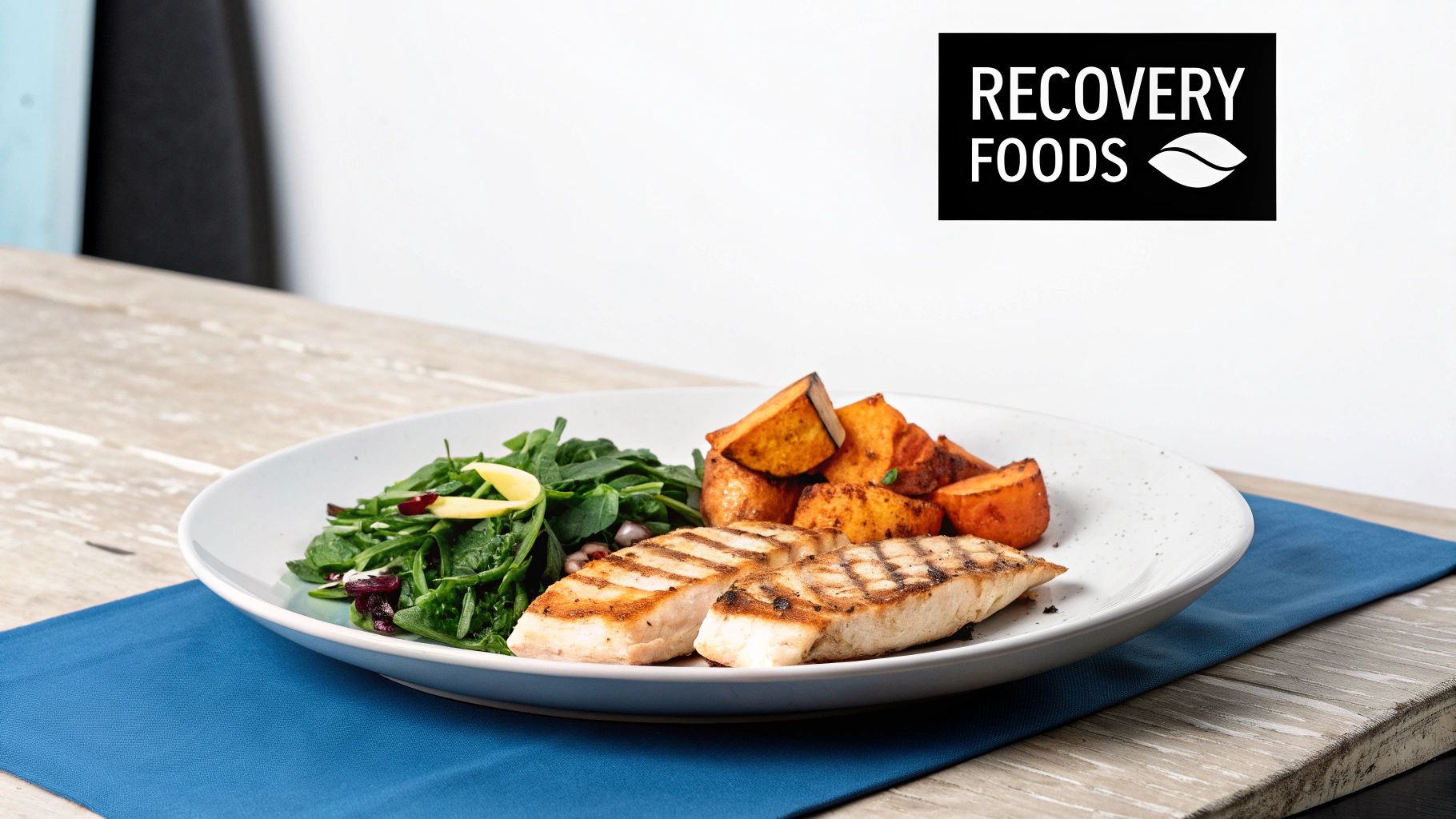
Let’s be honest—the supplement industry can feel like a maze. Every shelf is packed with bottles promising impossible gains, and it’s incredibly hard to tell what’s legit and what’s just clever marketing. The simple truth? Most of them aren't necessary if your nutrition is already on point.
However, a handful of supplements are backed by solid science and can give you a genuine advantage. Rather than chasing a magic pill, a truly effective nutrition for strength training strategy uses proven supplements to fill specific gaps. It’s all about being tactical, not just buying the flashiest tub on the shelf.
Think of it this way: supplements are tools, not the entire toolbox. You need to pick the right one for the job. You wouldn't try to tighten a bolt with a saw, and you shouldn't take a supplement without knowing exactly what it's supposed to do for you.
The Proven Power-Lifting Trio
Before you get lost in exotic ingredients and complex formulas, let’s focus on what consistently works. For anyone serious about lifting heavy, three supplements stand out, with decades of research proving their worth. These are the foundational tools that can make a real, noticeable impact on your strength and recovery.
-
Creatine Monohydrate: If there's one supplement every strength athlete should consider, this is it. Creatine is arguably the most researched and effective legal performance booster available. It works by topping off your body's energy reserves for explosive movements, allowing you to grind out those extra reps that truly drive progress. For a deeper dive, check out our guide to creatine for muscle growth.
-
Protein Powder: A quality protein powder isn't a shortcut to building muscle; it's a tool for convenience. Hitting your daily protein goal—somewhere around 1.6 to 2.2 grams per kilogram of body weight—is non-negotiable for muscle repair. A whey or plant-based shake makes this a whole lot easier, especially on busy days or right after a grueling workout.
-
Caffeine: There’s a good reason this is the world's favorite stimulant. When used strategically before training, caffeine can sharpen your focus, make heavy weights feel a little lighter, and give you the kick you need to attack your workout with intensity.
Remember, supplements are the icing on the cake, not the cake itself. They are the 10% that fine-tunes the 90% of effort you put into your training and nutrition.
Making Supplements Work For You
Deciding to use supplements is the first step. The next, and just as important, is figuring out how to use them consistently without it becoming a chore. Let’s face it, mixing messy powders isn't always practical, especially when you’re juggling work, life, and the gym.
This is where finding the right format makes all the difference. For instance, creatine gummies completely sidestep the hassle of powders and shakers. A product like Smash creatine gummies delivers the standard, effective 5-gram daily dose in a simple, portable form. It makes staying consistent effortless, whether you’re at home or on your way to the gym.
At the end of the day, the best supplement plan is one you can actually stick to. By focusing on the proven basics—creatine, protein, and caffeine—and choosing formats that fit your real life, you get all of the benefits without any of the extra cost or complication.
Building Your High-Performance Meal Plan
All the knowledge about macros and timing is great, but the real magic happens when you put it on a plate. This is where theory gets real. Building a meal plan might sound like a chore, but it’s really just about organizing your food choices so you can consistently hit your strength and recovery goals.
Think of it as creating a blueprint for your body. No contractor would build a house without a detailed plan, and you shouldn't try to build a stronger physique without one either. The two sample meal plans below show you how to apply the core principles of nutrition for strength training, whether you're trying to gain muscle or shed fat while keeping your strength.
Sample Meal Plan For Muscle Gain
When your goal is to pack on serious muscle, you need to be in a caloric surplus. This just means eating more calories than your body burns, which gives you the extra energy and raw materials to grow. This plan is built around high-protein, nutrient-rich meals that fuel intense workouts and power your recovery.
- Breakfast (7 AM): A big bowl of oatmeal made with milk, mixed with a scoop of whey protein, a tablespoon of chia seeds, and topped with a sliced banana. This combo gives you slow-digesting carbs for lasting energy and a solid hit of protein to kickstart your day.
- Lunch (12 PM): 6-8 ounces of grilled chicken breast, a large sweet potato, and a cup of roasted broccoli. This is a classic strength-building meal, perfectly balancing lean protein, complex carbs, and essential micronutrients.
- Pre-Workout Snack (4 PM): A container of Greek yogurt with a handful of almonds. This gives you a nice mix of protein and carbs to fuel your workout without weighing you down.
- Dinner (7 PM): 8 ounces of lean ground beef cooked with whole-wheat pasta and marinara sauce, served with a large side salad. This meal is ideal for topping off your glycogen stores and supplying the amino acids needed for overnight repair.
Sample Meal Plan For Fat Loss
To lose fat while holding onto your hard-earned muscle, a slight caloric deficit is the name of the game. Here, the focus shifts to maximizing protein to keep you feeling full and protect your muscle, all while carefully managing your carbs and fats.
- Breakfast (7 AM): A three-egg omelet loaded with spinach and bell peppers, with half an avocado on the side. Eggs deliver top-tier protein and healthy fats that will keep you satisfied for hours.
- Lunch (1 PM): A large salad with 6 ounces of grilled salmon, mixed greens, cucumber, tomatoes, and a light vinaigrette. Salmon is a powerhouse of protein and anti-inflammatory omega-3 fats.
- Snack (4 PM): A scoop of protein powder mixed with water or unsweetened almond milk, alongside an apple. This is a smart, low-calorie, high-protein choice to get you through to dinner.
- Dinner (7 PM): 6 ounces of baked cod, a cup of quinoa, and a serving of steamed green beans. A lean, nutrient-dense meal that supports recovery without piling on extra calories.
Remember, these are just templates. The real key is to find foods you actually enjoy and then tweak the portion sizes to hit your specific calorie and macro numbers. Consistency will always beat perfection.
Making Meal Prep Sustainable
Let's be honest: the single biggest hurdle to a solid nutrition plan is a lack of prep. A few focused hours on a Sunday can literally set you up for a full week of success.
- Batch Cook Your Staples: Cook up big batches of versatile proteins like chicken breast and ground turkey, plus go-to carb sources like brown rice and quinoa.
- Portion Everything Out: As soon as your food is cooked, divide it into individual containers. This makes grabbing a healthy meal just as easy as ordering takeout.
- Prep Your Veggies: Wash and chop all your vegetables for the week at once. Store them in airtight containers so they're ready to be tossed into salads and stir-fries in seconds.
Planning your meals is easier today than it has ever been, largely thanks to major shifts in the fitness industry. The fitness center market has swelled to over $90 billion, and fitness app downloads are projected to soar past 5 billion worldwide. These tools often include features that help you build and track personalized nutrition plans, which is a massive help for strength athletes of all ages. You can learn more about how these global fitness trends are impacting nutrition and what it means for you.
Frequently Asked Questions About Strength Training Nutrition
When you dive into the world of nutrition for strength training, it’s natural to have a few questions pop up. Let's tackle some of the most common ones with practical, no-nonsense answers.
How Much Water Should I Drink for Strength Training?
A solid baseline for most people is about 3-4 liters (around 1 gallon) of water per day, but don't treat this as a rigid rule. The real goal is to stay consistently hydrated, and the easiest way to check is by keeping an eye on your urine color. Aim for pale yellow.
Of course, if you're hitting it hard in the gym or training in the heat, you'll sweat more and need to up your intake accordingly. Don't underestimate this! Even a slight 1-2% dip in hydration can noticeably tank your strength, power output, and even your focus.
Can I Build Muscle on a Vegetarian or Vegan Diet?
You absolutely can. With a little strategic planning, building serious muscle on a plant-based diet is completely achievable. The key is simply ensuring you get enough total protein from a variety of sources to cover all your essential amino acid needs.
To make it work, you'll want to make high-protein plant foods the star of every meal. Think lentils, chickpeas, tofu, tempeh, seitan, and quinoa. A good vegan protein powder can also be a game-changer for hitting your daily targets without feeling overly full.
If you're looking for more in-depth advice on this topic and others, you can explore further articles on strength training nutrition.
How Important Is Eating Right After My Workout?
That legendary 30-minute "anabolic window" we all used to stress about? It turns out it's a lot more forgiving than we first believed. What truly matters for long-term progress is hitting your total daily calorie and protein goals, day in and day out.
That being said, having a meal with a solid mix of protein and carbs within 1-2 hours after you train is still a great practice. It helps jump-start muscle repair and tops off your energy stores, setting you up for a better recovery. This becomes especially important if you happen to train fasted.
Ready to make your supplementation effortless and effective? The Smash.com creatine gummies deliver the proven 5-gram daily dose of creatine without the mess of powders. Fuel your gains and smash your goals by checking out our delicious gummies at https://smash.com.